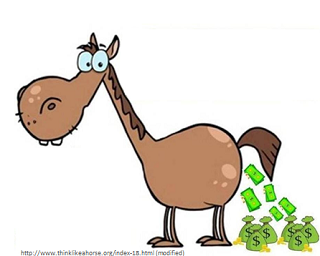One of Countless Biomass Projects That Won't Work

I don’t find the business plan compelling. This concept implies collecting and sorting horse waste from farms all over the US, to create a low-value product. Now, if these horses were defecating $20 bills, we could have an interesting conversation. Seriously, I’ve seen dozens of plans that call for processing higher-value waste streams, and the business value simply isn’t there, even when the product is biofuels or electricity that can be sold at a premium price.
A few factors to consider:
Most horses are not on bedding at all; they live in fields, and those fields are literally in every state in the union. You’re going to somehow bring that bedding to a central location, sort it, process it, package it, and sell it into some distribution? Btw, I had a 45-acre ranch that, at its zenith, had 92 horses on it. At great expense, my employees (and sometimes I myself) collected the manure and the bit of soiled bedding, made a mound out of it, processed it (occasionally turning it with the tractor and keeping it wet with a sprinkler for a year), then spread the compost on the fields. Lots of work and expense for low-grade fertilizer. (Cow manure is far better.) The only reason we did it was that keeping large mounds of manure is a health hazard, especially since we were in a zone where rainwater runs off, carrying it into a river and ultimately the ocean.
Now consider cows, pigs and chickens–starting with chickens, of which there are 7.6 billion (1000 times more than horses) in the U.S. alone. And, unlike horses, whether they exist to lay eggs or to be slaughtered for food (or some combination), almost all are confined to extremely manageable spaces. The case is the same with cows, whether they’re there for milk or hamburger; they are confined for the convenience of the “farmer”, meaning agribusiness. This means that collecting the manure and urine, which are rich in nutrients, is really easy.
But even with all this logistical ease, there are still very few locations that convert this waste stream into some sort of value: the economics simply aren’t there.
Will this change in the future? Without a doubt. When? I don’t know. Three main factors:
• People of conscience are pushing to make these conditions less cramped and cruel for the animals. I support this 100%, though it will militate away from cost-effectively converting their waste. Fortunately, there are two other factors that will push in the right direction:
• Legislation: In many cases, untreated piles/rivers of animal waste are creating horrific conditions in terms of odor and, more importantly, dangers to human health. There are large lakes (several square miles each) in Ohio, where incredible numbers of chickens are kept, that are simply enormous cesspools. The people who live in the neighboring regions will not tolerate this forever.
• Better cost-effectiveness of methane digesters and other technologies for processing waste.
Hope this was helpful, albeit discouraging to your current idea.
